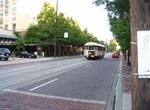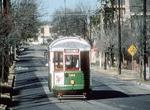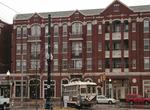MATA McKinney Avenue Transit Authority
![]()
MATA's Oporto (#122) and Melbourne (#369) trams pass at McKinney Avenue & St. Paul, March 1990. Photo by Peter Ehrlich.
Overview
Dallas--"Big D"--has had a long and varied traction history. Interurbans operated by Texas Electric and Northern Texas Traction hustled riders to Plano, Denton, Corsicana, Waco, Fort Worth and other northeastern Texas cities and towns, sometimes at record speeds. In Dallas and its nearby neighborhoods streetcars plied major streets and boulevards, with Dallas Railway and Terminal as the ultimate operator, and DR&T was Texas's largest urban traction system.
Dallas was home to one of the largest fleets of "Stone & Webster"-style stepped-arch roof trolleys in any American city. These turtleback cars had a high arch over the main body of the car, with lowered vestibule arches. This was the style favored by the Stone & Webster utility and traction management company of Boston, and Stone & Webster types ran in Dallas, Waco, El Paso, Seattle, and even Edmonton, Alberta, as well as other cities. Later, DR&T purchased a large number of Peter Witt cars, which were converted from front-entrance, center exit to rear exit in the 1930s. And DR&T also boasted one of only two new PCC fleets in the South, with 25 double-end cars from Pullman built in 1945.
Like other American cities, the streetcar fell into rapid decline after the end of World War II hostilities. The last Texas Electric interurbans ran to Waco on the last day of 1948. Unlike most cities, however, Dallas converted many of its electric rail lines to trolley coach, and ultimately had the largest fleet of trolleybuses retrofitted with air conditioning.
By 1955 only three lines remained, covered sufficiently by the 700-class ex-Peter Witts and the PCCs. Finally, on January 15, 1956, Big D said sayonara to the streetcar as Route 10-Sunset ceased operations. The PCCs were sold to Boston later in the decade. The trolley coaches lasted in Dallas for 10 more years, and electric traction in the Big D fell silent--until 1989.
In early 1983, McKinney Avenue, which runs northeastward out of downtown Dallas through a gradually gentrifying district, was undergoing resurfacing. During this project, rails of the long-gone McKinney Avenue streetcar line were unearthed, and district leaders immediately wondered if these could be brought back to life, with authentic vehicles from a bygone era providing service. They chipped in money for the obligatory feasibility study. The answer was a resounding "Yes!".
During the next six years, plans were drawn up, and the rails were once again made worthy to carry streetcars. Four trolleys were purchased and/or restored for initial operation: two ex-Dallas cars, a Melbourne tram, and an Oporto, Portugal 4-wheel trolley built by Brill. And on June 22, 1989, the first trolley in 33 years ran on its own power in Big D. A month later, the line opened with great fanfare, a 4-streecar welcoming parade, high hopes and many standing-room-only runs.
After the inertia and euphoria generated by the line's opening year, reality set in, and things quieted down, resulting in some service retrenchment and layoffs along with the use of some volunteer (unpaid) motormen. Two years later, service increased again, running from 10:00am to 10:00pm. Charters, special events and birthday and children's parties were major sources of revenue for MATA--and have continued to this day.
The status quo was maintained through the 1990s, while more pieces of rolling stock were picked up. A wood former North Texas Traction interurban box motor was acquired, and restoration and transformation to a deluxe passenger car began. Four more Dallas carbodies arrived in varying states of decay, as well as two ex-Toronto PCCS. Partial restoration has begun on these units, but three are presently stored off-property while the fourth is nearing completion. During 1999, a 17-month rebuilding of McKinney Avenue began, requiring periodic shutdown or shortlining of MATA operations. New storm drains, paving and new trackage in some cases were installed. All of this work was completed by January 2001, and MATA celebrated with yet another 4-trolley parade.
In 1996, Dallas's transit system, DART, began light rail service on two routes from downtown to Oak Cliff and South Oak Cliff southwest of downtown. By 1997, a route from downtown to Park Lane in north central Dallas opened, with the underground Cityplace station opening later. Meanwhile, MATA was developing plans to build two extensions to connect with DART LRT at both ends, one serving the DART Cityplace Station and new condo developments further eastward in the McKinney corridor, and the other reaching the trendy West End entertainment and culinary mecca of Dallas. also serving the DART West End light rail station. The Cityplace extension of what was now called the "M-Line" opened for service on June 27, 2002, and was an immediate transit improvement. MATA and DART fares were now accepted on either system. Indeed, DART has been one of McKinney Avenue Transit Authority's largest backers since nearly its inception. The connection with DART resulted in the institution of early morning weekday service on MATA.
Development of the West End extension, on the other hand, is progressing very slowly. Although some utility relocation work has commenced, no time frame has been announced for the period of construction. For a while MATA ran a connecting historic bus from McKinney and St. Paul, but that has since been discontinued.
Nevertheless, MATA's success in becoming an integral part of a re-emerging neighborhood ensures a bright future. Recently, plans for a second streetcar route in Dallas have surfaced. This would be more of a downtown circulator-type route, but could possibly connect with MATA.
In November 2006, a city bond package was passed that included money for another MATA expansion. A new line will run down Olive Street (parallel to St. Paul) along the west side of the Art Museum to the DART transit mall. There the line will turn left to the Cancer Survivors' Plaza parallel to DART's tracks. This extension will also allow MATA access to a donated piece of land, which is planned to be used as a second car barn. Preliminary engineering studies have begun on the project.
2012 Updates
On December 13, 2011, MATA celebrated the opening of its new turntable at the end of Cityplace West Blvd. Right now it seems unnecessary since MATA's four operating trolleys are double-ended. However, this is part of an expansion that will allow MATA to operate single-ended streetcars. MATA's Phase 2 expansion, scheduled to open in 2013, is an extension on Olive Street to the DART transit mall. In 2014, MATA plans to open a downtown loop with tracks on Federal Street from Olive to an extension of the current St. Paul tracks. Then MATA can put its ex-Toronto PCCs and other single-ended cars into service. MATA believes its streetcar turntable is currently the only one in North America.
Roster
Currently, there are 5 operating streecars on MATA's system. Three of these are needed at peak times--lunch hour, evening rush, and Friday and Saturday nights.
Oporto, Portugal 122 "Rosie": Built in 1909 by J. G. Brill of Philadelphia in kit form and assembled by the Oporto tramway system. Following retirement in 1978, car 122 came to the United States along with many other single-truck streetcars. It appeared in San Francisco's 1983 Historic Trolley Festival, when it was purchased by MATA as its first streetcar. It is sponsored by Rosewood Properties; hence the nickname "Rosie". In 2006, MATA will celebrate "Rosie"'s 100th anniversary.
Dallas 186 "The Green Dragon": 186 was built in 1913 by St. Louis Car Co. and served Dallas for 43 years. It is in the standard Stone & Webster stepped-arch roof design. Following retirement, it was purchased by a farmer, and rescused from "hay bale storage duty" by MATA principals Ed and Kate Landrum, who cosmetically restored it for a now-defunct sports museum. It was then donated to MATA, outfitted with Melbourne trucks, electricals and peripherals, and has been in nearly constant use since 1989.
Melbourne 369 "Matilda": One of hundreds of classic Melbourne W2 trams, car 369 was purchased in 1986 and was ready for operation on opening day in 1989. In keeping with its Down Under heritage, 369 has the sobriquet "Matilda".
Dallas Birney 636 "Petunia": This single-truck Birney Safety Car was built by Brill in 1920, and ran until 1947. In 1980, Ed Landrum purchased the car and restored the carbody, outfitting it with ex-Melbourne motors and controls, and a specially-lenghtened Melbourne W2 truck. 636 has received the name "Petunia".
PCC 143 "Winnie": This car, MATA's newest and first operational PCC, started life in 1944 as Washington, DC 1506. Renumbered as #4, it was one of several purchased by Leonard's M&O Department Store in Fort Worth in 1962 and rebuilt for a new line from an outlying parking lot to the company's downtown store. Later, Tandy Corp. took over the facility and rebuilt the car with a rather angular, futuristic body called "Radio Shack Modern". When Tandy Corp. announced that this line would be shut down on August 31, 2002, MATA negotiated for the purchase of this car and embarked on a major rebuild, including returning the doors to stepwell arrangement and installing offside doors for double-end operation. It went into service on June 29, 2004. Because the carbody is reminiscent of a Winnebago motor home, number 143 is nicknamed "Winnie".
On July 21, 2010, number 143 "Winnie" was moved to the DART Shops for storage with our ex-Toronto PCCs. Winnie has been out of service for several years, and with the arrival of ex-Dallas 754, there was no room to store all of the cars in the present car barn. Winnie will become a test-bed for new technologies that can be applied to the other cars in the MATA fleet. She is expected to re-enter service in the future.
Other cars undergoing restoration or awaiting restoration:
North Texas Traction 332 "The Morning Star": This is a box motor built by North Texas Traction in its own shops in 1912. After retirement in 1932, it was sold to a farmer, and was rescued by a MATA member in 1986. Restoration and transformation to a passenge car began in 1992 and continues in 2005.
Dallas 183 & 189: Identical to 186.
Dallas 323: Similar to 186 but has 13 side windows. 323 was built in 1915 for the North Texas Traction, which operated a local line from Dallas to Oak Cliff. NTT sold this line to DR&T in 1934, and 323 was retired in 1952. It was sold to a theme park in Abilene, TX for use as a ticket office and souvenir shop. When this closed, MATA purchased the carbody.
Dallas 754: One of a large number of Peter Witts built in 1926 by American Car Co., 754 originally had the standard front-entrance, center-exit Peter Witt arrangement. All cars in this class were rebuilt by DR&T in 1941 with end doors. 754 lasted to the end of service on Jan. 15, 1956 and then was preserved by the son of the DR&T president. 754 was donated to MATA in 1994, and restoration work was begun by an outside contractor. In 2005, it was nearing completion, but still needs funds to finish the job.
Toronto PCCs 4613 and 4614: These PCCs were outshopped by Canadian Car & Foundry in 1950 (body shells by St. Louis Car Co.) as 4500s. In 1990, 18 of this class were selected for rebuilding for Toronto's new Harbourfront line, renumbered in the 4600 series, and served until December 1995, when they were retired. MATA purchased the pair in 1996. Being single end-cars, they won't be able to operate on McKinney Avenue until the West End line is constructed and the turntable at Cityplace is installed. In the meantime, they are stored at DART's LRT Maintenance Facility, and MATA has purchased standard-gauge trucks for them, replacing the odd 4'-10 7/8" Toronto gauge trucks.
MATA Route, Fares and Hours
Trolleys operate 7 days a week all year. Weekday hours are 7:00am to 10:00pm; Saturdays, 10:00am to 10:00pm; Sundays and holidays, 12:00 noon to 10:00pm. Fares are free, but voluntary donations are cheerfully accepted.
Station By Station
The route begins on St. Paul Street about 100' north of Ross Street, in the Arts District of Dallas. Heading north, the line crosses the Woodall Rogers Freeway and reaches McKinney Avenue, where it turns right (east) and spreads into double track.
The first major point of interest reached is the Crescent, a connected three-building highrise comprising a hotel, apartments and condos, and an upscale shopping mall. Now the line plunges into the gentrifying McKinney District, where small stores, offices and restaurants dot the street. These include the Hard Rock Cafe, one of MATA's biggest backers; Avanti; and S & D Oyster Company. Further out, the inbound and outbound tracks separate at Allen Street. Heading eastward, the line crosses Bowen Street, where switches lead to and from the carbarn on Bowen Street at Oak Grove. It is usually possible to visit the barn during business hours. Next up it the Cafe Express and McKinney Place, which is a timepoint and short layover area. Crews make reliefs here.
At Hall Street, the original 1989 line's curve is seen on the left. Trolleys now continue out McKinney across Lemmon West and Lemmon East, busy north-south arteries. Some strip malls are located here. Next comes the new West Village condo and shopping complex, opposite Cityplace Blvd. A switch here allows cars to continue east, but in service, trolleys turn right onto Cityplace Blvd and operate about a quarter-mile along a median strip to the DART Cityplace Station, where transfers with DART light rail trains are made. Patrons going to the tall Cityplace Building (headquarters for Southland Corp. of 7-Eleven fame) across the North Central Expressway have to use the subterranean passage through the subway station. A unique funicular elevator is located within this facility!
At Cityplace, the motorman will change poles and set up for returning to the main line. An old turntable has been purchased and will eventually be installed and utilized for turning PCC cars.
The trolley now heads back to McKinney Avenue and will turn right (through a spring switch) and run a half block to Blackburn, where it will turn left (north), operating along the west side of the street in a separate right-of-way facing southbound traffic. The streetcar will turn left again at Cole Avenue, where it will hug the south curb lane. A left-side stop is made at Newman Street, after which the rails reach Lemmon West. Here, the car will make a wide S-curve and pick up Cole Avenue again. This stretch of Cole is dotted with older homes and is probably the most picturesque portion of the line. At Hall Street, the old original line from 1989 joins up (inbound pull-out cars still use this turn). Finally, at Allen, the line sweeps left in a broad curve and rejoins McKinney (after passing the ubiquitous Starbucks). Double track continues for another mile or so, to St. Paul. Total running time is about 45 minutes.
Photo Gallery
| Five Random Images | ||||
 Image 37691 (205k, 1044x788) Photo by: Valerie Harvey Location: McKinney/Routh |  Image 37779 (197k, 720x467) Photo by: Peter Ehrlich Location: Cole/Allen |  Image 37803 (135k, 720x478) Photo by: Peter Ehrlich Location: McKinney/Allen |  Image 37804 (135k, 720x478) Photo by: Peter Ehrlich Location: McKinney/Blackburn |  Image 37806 (156k, 720x478) Photo by: Peter Ehrlich Location: McKinney/Cityplace West |
Photos By Location
Photo locations: St. Paul/Ross, St. Paul/Munger, St. Paul/Woodall Rogers Fwy, McKinney/St. Paul, McKinney/Harwood, McKinney/Olive, McKinney/Maple, McKinney/Leonard, McKinney/Fairmount, McKinney/Routh, McKinney/Boll, McKinney/Worthington, McKinney/Allen, McKinney/Sneed, McKinney/Bowen, McKinney Plaza, McKinney/Hall, McKinney/Lemmon West, McKinney/Lemmon East, McKinney/Cityplace West, Cityplace West Blvd., Cityplace/Uptown, McKinney/bet. Newman & Blackburn, McKinney/Blackburn, Blackburn St., Blackburn/Cole, Cole/Newman, Cole/Lemmon East, Cole/Lemmon West, Cole Avenue west of Lemmon West., Cole/Hall, Cole/Bowen, Cole/Allen, DART Yard, Carbarn
Links
Official Site - McKinney Avenue Transit Authority. The official site of the McKinney Avenue Transit Authority, including schedules, fares, and more.
Page Credits
By Peter Ehrlich